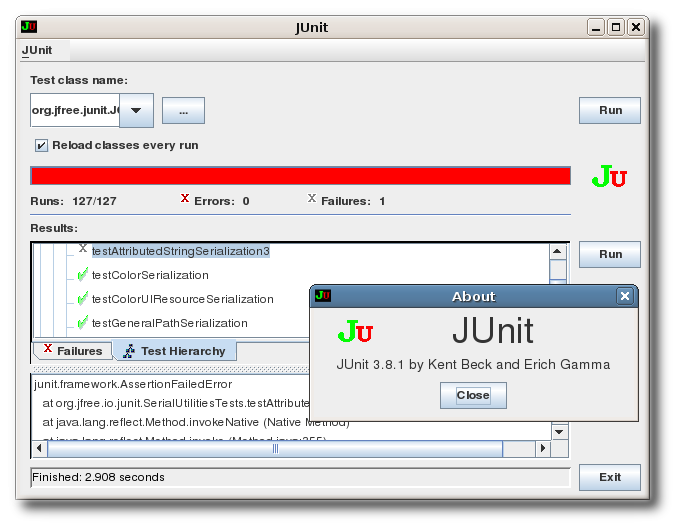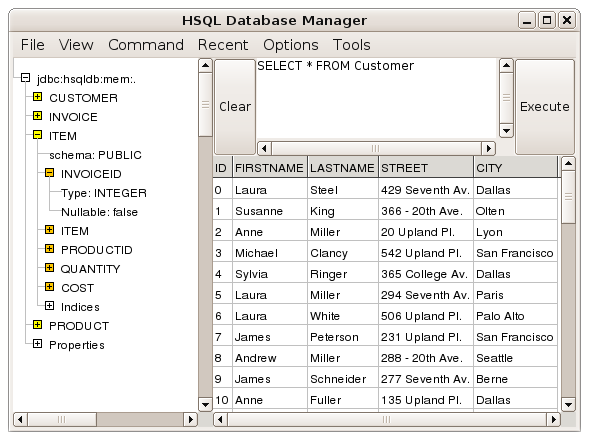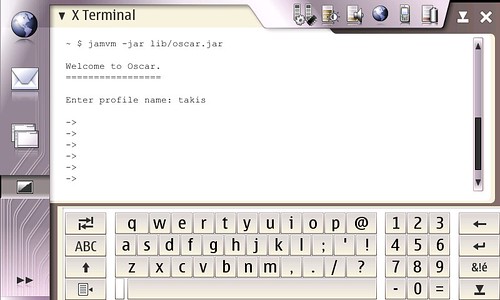Posted
on March 11, 2006, 12:56,
by mjw.
GNU Classpath 0.90 got imported into libgcj providing some nice new features. Still some small issues to cleanup, but most of the worked was just merging, compiling and testing things.
Some picures from GNU Classpath & Friends at Fosdem, and the meeting in A La Mort Subite are online. The pictures clearly show everybody had a very good time :)
Roman finished the last Ocean theme support in GNU Classpath cvs and has switched the default for Metal to it.

It certainly looks cool. But I think all the gradients on the components are a bit distracting compared with the old theme.
Comments Off on libgcj import, pictures, ocean
Posted
on March 6, 2006, 21:37,
by mjw.
GNU Classpath 0.90 “A La Mort Subite” released
At our GNU Classpath and Friends meeting during Fosdem a lot of cool demos were given that showed what is possible with GNU Classpath now. So we decided to push out a new release so everybody can play with all the new stuff (0.90 works out of the box with jamvm 1.4.2 or cacao 0.95). Some highlights:
JTables can be rearranged and resized. Free Swing text components support highlighting and clipboard. Much improved styled text. Fast event dispatching and lower memory consumption. Better support for mixing lightweight and heavyweight components in AWT containers. GNU Crypto and Jessie cryptographic algorithms have been added providing ssl3/tls1 and https support. Unicode 4.0.0 support. GIOP and RMI stub and tie source code tools. XML validaton support for RELAX NG and W3C XML schemas. New file backend for util.prefs. Updated gnu.regexp from POSIX to util.regex syntax.
But the most exciting thing must be that MegaMek started working. That will surely boost the productivity of our GNU Classpath hackers :)
Comments Off on 06 Mar 2006
Posted
on March 1, 2006, 17:02,
by mjw.
GCC 4.1 released
GCC 4.1 was finally released today. The gcj support is based on a slightly older GNU Classpath snapshot but it does include some really cool changes, new features, and fixes. You can read some more about it in an article I wrote a while ago on the GCJ part. “A look at GCJ 4.1“.
I am looking for similar overviews for the other parts of the GNU Compiler Collection. Dear lazyweb, please let me know if there are some high-level articles on the 4.1 changes in the general optimizer, c, c++, fortran, ada, objective-c[++] frontends, and new target support. There is so much going on around GCC that it is hard to keep up.
Comments Off on 01 Mar 2006
Posted
on February 28, 2006, 12:33,
by mjw.
back
Back from Fosdem plus GNU Classpath and Friends meeting. It was a great event! Really tired now :) Some presentation slides on JFreeChart, Cairo, Free Swing and vmgen are now available.
Comments Off on 28 Feb 2006
Posted
on February 23, 2006, 08:43,
by mjw.
The Fedora documentation team has been asking for Free FOP (Formatting Objects Processor – XSL-FO to PDF converter) and Thomas Fitzsimmons delivers. The result is still a bit boring since images are missing in the produced PDF file. But it can already be used to format 100+ page documents.
Comments Off on Wish you were here – Freeing Fop (and Batik)
Posted
on February 22, 2006, 07:42,
by mjw.
GNU Classpath and Friends – Get ready for Fosdem!
Super excited about Fosdem next weekend. There will be lots of cool talks and demos and it will be so nice to meet all the hackers. If you are coming please check out the practical info about the developer room. And if possible come to the Friday night meeting to have a beer together.
Comments Off on 22 Feb 2006
Posted
on February 19, 2006, 23:18,
by mjw.
With all the excitement about Free Swing you would almost forget about our AWT implementation(s). Got some nice progress with our AWT gtk+ peers:

Lillian is also working on some AWT issues now. But there are still lots of hairy corner cases to get right. It is good to see some progress here since Michael is hacking on gcjwebplugin again and lots of applets still use AWT.
Comments Off on Some AWT gtk+ progress
Posted
on February 16, 2006, 14:02,
by mjw.
A look at GCJ 4.1
LWN published A look at GCJ 4.1 (and beyond). It seems there will be a GCC 4.1 RC1 release soon so everybody can try it out. (update: no rc1 yet, hopefully over the weekend.)
Although the article didn’t discuss any speed improvements (it is mainly about the progress of the standard core library) there are some comments to the article pointing out different benchmarks. There were also some interesting threads about performance on the gcj mailing list. Some reports claim native-complied GCJ modules are almost always about 30-40% faster than other implementations (at least on real world code). Others have micro-benchmarks that show that there are cases where gcj isn’t as fast at all. But in the end you have to be careful about what you benchmark, or GCJ will just optimize away all non-used code :)
Comments Off on 16 Feb 2006
Posted
on February 8, 2006, 11:49,
by mjw.
Comments Off on Funky
Posted
on February 3, 2006, 14:13,
by mjw.
GNU Classpath and Friends @ Fosdem 2006
The full GNU Classpath and Friends schedule has been published. And there is a Wiki page for coordinating all events around the meeting at http://developer.classpath.org/mediation/Fosdem2006.
Please add yourself if you will participate in the event or want to show a cool application running on the free stack during the Show your App/Hack your App session.
Comments Off on 03 Feb 2006


